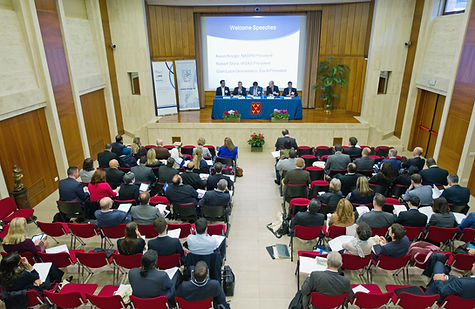STUDENT AFFAIRS & SERVICES
Student Affairs, Student Life!
Student Affairs Professionals work to provide services and support for students and drive their welfare designing their success.
The core business of Student Affairs is to create an experience that enhances the growth and development of the students and creates the conditions for engaged and active learning.
The profession of Student Affairs grew in the United States from the campus experience. At the beginning most early institutions were residential and the tutors lived in the Halls with the students. Their focus was on control of the student as opposed to modern philosophy which focuses on the development of the student as a whole but has always connected those interested in the welfare of students.
Student Affairs and Services are today a huge reality in constant evolution. Institutions increasingly realize that their success depends on creating a student-centred experience.
The Students Services are tailored for specific populations, such as commuter students or first-year students and go in in the perspectives of social inclusion, cross-cultural communication in order to involve the students in their communities and to give them all the tools to develop their talents and discover their passions.

The contribution of EucA
In this era of globalization Student Affairs and Services practitioners have come to understand the essential nature of embracing international paradigms.
Student Affairs and Services administrators are now together to network, to share ideas, collaborate and synergize with one another across the borders.
EucA contributes actively in the exportation of best practices in IASAS in Europe, thanks to the active collaboration with NASPA and IASAS.
Participating at the annual NASPA conference EucA has the opportunity to capture best practices for its Halls of Residence and establish partnerships with Student Affairs colleagues outside Europe.
In the book ‘Supporting Students Globally in Higher Education’ published by NASPA, Higher Education leaders around the world explore how the profession is developing globally and how support to students is actually delivered, with a particular focus on internationalization.
EucA President Gian Luca Giovannucci co-authored the chapter on the Global Dialogue among practitioners based on EucA’s experience on hosting the 2014 Global Summit on Student Affairs in Rome, Italy.
The Global Summit was made up of large and small group meetings, panel discussions, receptions, special events, and more. Discussions on topics of mutual interest and talk about a future a global agenda, establishing meaningful relationships have been the main outcomes of the Summit.
The book, Student Affairs and Services in Higher Education: Global Foundations, Issues, and Best Practices, 3rd edition, presented by the International Association of Student Affairs and Services (IASAS) and published by Deutshes Studentenwerk (DSW), saw the collaboration of more than 250 contributors to create a comprehensive guide for both graduate students and professionals in Higher Education.
The book is a reference for every actor in the Higher Education sector: it includes reports and materials about student affairs services and practices from over 125 countries in the world and addresses the most comprehensive range of topics connected to Student Affairs and Services. EucA, specifically, wrote one of the informative chapters about the Italian case in the section “Unique delivery systems in student affairs and services around the world” and the chapters “Career Services and Employment” and “Community Service and Service Learning”.
This 3rd edition focuses on ways to build an effective student affairs and services operation that puts students at the centre of all efforts by supporting them in their academic endeavours and enhancing their personal, social, cultural, and cognitive development. It aims to help professionals deliver a high quality, well rounded higher learning experience and to increase students’ retention and progress toward graduation. In addition, it wants to enhance students’ career/employment prospects and lifelong learning interests while conducting a life as a responsible, contributing community member and citizen.




